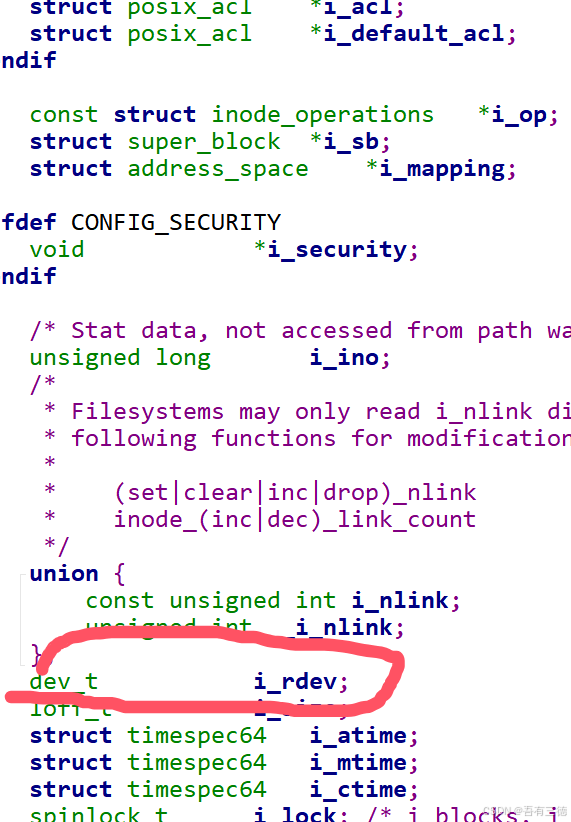四盏灯:原则上我们想要实现流水灯!需要怎么做?一个驱动 -> 生成一个设备文件!一个设备文件怎么控制四个 LED 灯?你有两种方法:1 : 你写四个驱动 你就能生成四个 LED 灯!四个驱动有什么特点没除了引脚不一样 其他代码几乎都一样!2 : 你写一个驱动 却生成四个设备文件!
一驱多设
前置
open和relase参数一样,如果说多个设备用一套open,close,我们该怎么确定是哪个灯呢,我们可以想到stm32 hal库串口中断,通过回调函数参数的值,判断是哪个串口 。
同理,对于多设备匹配一个open,我们可以也通过参数 inode-> r_dev 即通过设备号判断是那个设备。
由于inode结构体过于大,就只展示一小部分
驱动源码
#include "linux/device.h"
#include "linux/export.h"
#include "linux/fs.h"
#include "linux/gpio.h"
#include "linux/mod_devicetable.h"
#include "linux/module.h"
#include "linux/of.h"
#include "linux/of_gpio.h"
#include "linux/platform_device.h"
#include "linux/cdev.h"
#include "linux/printk.h"
#include "linux/slab.h"
typedef struct g{
uint32_t pin;
char name[32];
enum of_gpio_flags gpio_flag;
struct g *next;
}GPIO;
GPIO head;
struct class * cls;
struct cdev * cdev;
static dev_t dev_num;
struct platform_device *node;
static int open (struct inode *inode, struct file *file)
{
GPIO *p=&head;
for(uint8_t i=0;i<of_gpio_named_count(node->dev.of_node,"led_pin");i++)
{
if(dev_num+i==inode->i_rdev)
{
gpio_set_value(p->next->pin,1);
}
p=p->next;
}
return 0;
}
static int close (struct inode *inode, struct file *file)
{
GPIO *p=&head;
for(uint8_t i=0;i<of_gpio_named_count(node->dev.of_node,"led_pin");i++)
{
if(dev_num+i==inode->i_rdev)
{
gpio_set_value(p->next->pin,0);
}
p=p->next;
}
return 0;
}
static struct file_operations fops={
.owner=THIS_MODULE,
.open=open,
.release=close,
};
static int probe(struct platform_device *d)
{
node=d;
head.next=NULL;
printk("%d\r\n",of_gpio_named_count(d->dev.of_node,"led_pin"));
for(int i=0;i<of_gpio_named_count(d->dev.of_node,"led_pin");i++)
{
GPIO *tem=kzalloc(sizeof(GPIO), GFP_KERNEL);
tem->pin= of_get_named_gpio_flags(d->dev.of_node,"led_pin",i,&tem->gpio_flag);
if(tem->gpio_flag==OF_GPIO_ACTIVE_LOW)
{
gpio_request(tem->pin,"led");
gpio_direction_output(tem->pin,1);
}
else
{
gpio_request(tem->pin,"led");
gpio_direction_output(tem->pin,0);
}
tem->next=head.next;
head.next=tem;
sprintf(tem->name,"led_%d",i);
}
printk("666\r\n");
alloc_chrdev_region(&dev_num, 0,of_gpio_named_count(d->dev.of_node,"led_pin"), "led");
cdev= cdev_alloc();
cdev->ops=&fops;
cdev_add(cdev,dev_num,of_gpio_named_count(d->dev.of_node,"led_pin"));
cls= class_create(THIS_MODULE, "led");
GPIO *p=&head;
for(int i=0;i<of_gpio_named_count(d->dev.of_node,"led_pin");i++) {
device_create(cls,NULL,dev_num+i,NULL,p->next->name);
p=p->next;
}
return 0;
}
static int remove(struct platform_device *d)
{
printk(KERN_INFO "Goodbye, world!\n");
return 0;
}
static struct of_device_id match={
.compatible="led",
};
static struct platform_driver driver={
.probe=probe,
.remove=remove,
.driver={
.name="led",
.of_match_table=&match,
},
};
static int __init start(void)
{
platform_driver_register(&driver);
printk("hahaha\r\n");
return 0;
}
static void __exit stop(void)
{
platform_driver_unregister(&driver);
printk("gun\r\n");
}
module_init(start);
module_exit(stop);
MODULE_LICENSE("GPL");